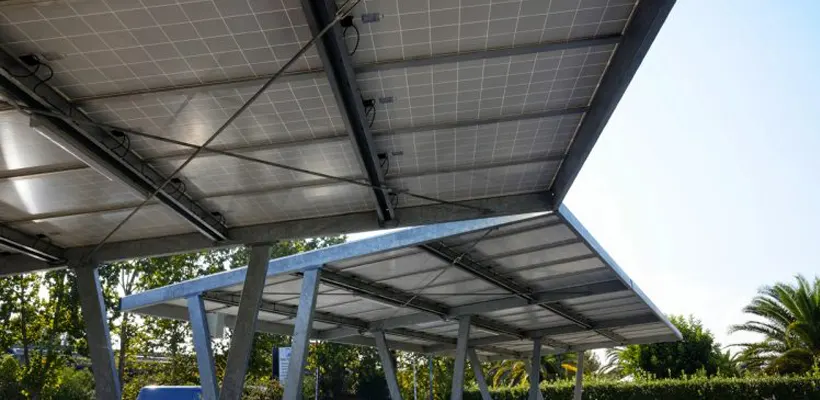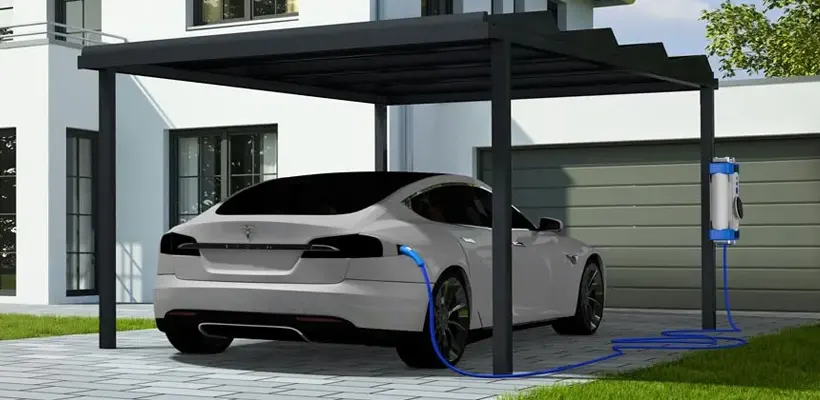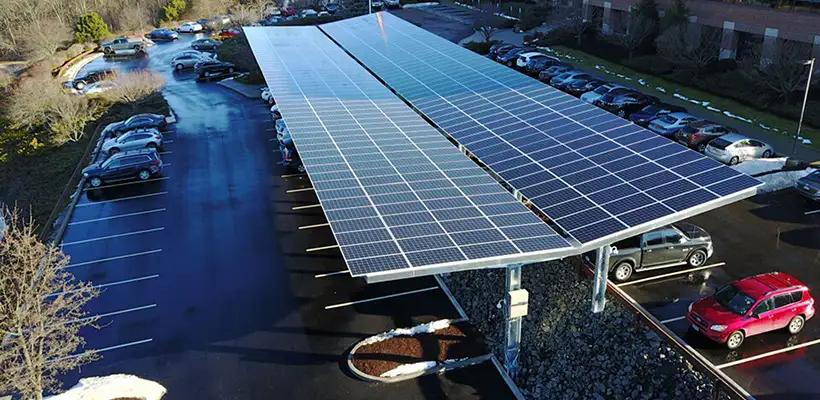- HOME
- ABOUT US
- SOLUTIONS
- Metal Roof PV Mounts and Systems
- Flat Roof Solar Panel Mounting Systems Solutions
- Tile Roof Solar Mounting Systems Solutions
- Solar Tracking Solutions for Commercial PV Projects
- Ground Solar Mounting Systems Solutions
- Floating Solar Solutions - PV Systems
- PV Solar Carport Mounting Systems Solutions
- Balcony Solar Panel Mounting Systems Solutions
- PRODUCTS
- PROJECTS
- COMPANY NEWS
- BLOG
- Contact Us

In recent years, as individuals have sought to diminish their dependence on fossil fuels, a significant contributor to climate change, and hope to economize on electricity expenditures, numerous homeowners opt for roof-mounted systems, leveraging unused space effectively. Nonetheless, a solar carport emerges as a feasible alternative, offering both a renewable energy system and shaded parking spaces on the same premises.
Here, we have prepared a comprehensive guide to help determine if a solar carport is a right fit for you.
What Is A Solar Carport?
A solar carport is a sheltered parking space with a covering crafted from PV panels. Manufacturers can structure these carports for individual parking spaces akin to those in residential driveways or link them in a series to span entire commercial parking areas.
Put plainly, a solar carport is a frame fitted with photovoltaic panels over a parking space. This dual-purpose innovation offers a protective roof for vehicles and produces electrical energy for your dwelling. Integrating an EV charging station with a solar carport is a feasible option for electric vehicle owners.
The Benefits of Solar Carports

1. Renewable Energy Production
Solar carports play a significant role in generating renewable energy from the sun, contributing to a marked reduction in reliance on fossil fuels. This shift not only aids in minimizing greenhouse gas emissions but also supports global efforts toward sustainable energy solutions. Furthermore, the energy produced can substantially mitigate your electricity expenses, making solar carports an economically sound investment.
2. Electric Vehicle Charging
Equip your solar carport with an electric vehicle (EV) charging station and it transforms into a convenient, eco-friendly hub for powering your EV. This setup not only encourages the use of electric vehicles but also ensures their operation has a minimal carbon footprint, reinforcing your commitment to environmentally responsible choices.
3. Efficient Use of Space
Solar carports exemplify efficiency by converting existing parking areas into valuable, energy-generating assets. This effective utilization eliminates the need for additional land, making solar carports an ideal choice in urban contexts where space is a coveted commodity. This spatial efficiency underscores their practicality and convenience, adding to their appeal.
4. Protection for Vehicles
Beyond energy production, waterproof solar carports offer robust protection for parked vehicles against various elements such as sun, rain, and snow. This shield extends the life of vehicles by reducing their exposure to adverse weather conditions, ensuring they remain in optimal condition for extended periods.
5. Increase Property Value
The integration of a solar carport is a strategic enhancement to your property, augmenting its value substantially. This increase is not just in terms of monetary worth but also in improved energy efficiency and reduced long-term energy costs, making your property a more attractive and sustainable choice for prospective buyers.
6. Tax Incentives and Rebates
The installation of solar structures like carports often attracts various financial incentives in many regions. These incentives, including tax rebates and deductions, can significantly offset the initial investment costs, making the switch to solar energy more affordable and enticing.
7. Low Maintenance
With minimal upkeep requirements, solar carports ensure long-term reliability and ease of use. This low maintenance aspect not only reduces additional costs and effort but also enhances the overall user experience, solidifying its status as a practical and hassle-free renewable energy solution.
8. Versatility
The adaptability of solar carports is evident in their suitability for diverse settings, including residential, commercial, and industrial locations. This versatility ensures that various sectors can harness the benefits of solar energy, promoting widespread adoption and maximized impact.
How Does a Solar Carport Work?
Solar carports harness solar energy by collecting sunlight and transforming it into electricity, similar to other solar panel installations, with the solar panels positioned atop the carport. The distinction between a solar carport and a typical carport lies in its design.
Solar carport systems include racking for modules, which eases installing and replacing solar panels. Moreover, all the modules within the solar panel array atop the carport interconnect and link to a combiner box. This box directs power through an inverter, ensuring efficient energy conversion and utilization.
How Much Does a Solar Carport Cost?
According to the latest data from the National Renewable Energy Laboratory, installing a 22-panel residential rooftop solar system costs $2.71 per watt. The installation cost of a solar carport may range between $14,600 for a 5.4 kW system and $19,500 for a 7.2 kW system.
Note that these estimates apply to rooftop solar systems, which are typically more intricate to install than solar carports. Consequently, the cost of installing a solar carport might be considerably lower. However, precise cost calculations for solar carport installations are only possible by obtaining a quote from a specialized installer.
Potential financial incentives, including federal credits and state or utility rebates, may apply to solar carports. Presently, a 26% federal tax credit is available, scheduled to expire in 2024, subject to amendments in national legislation. If eligible, individuals could see the cost of a $15,000 system lowered to an adjusted price of $11,100 due to this tax credit.
Is a Solar Carport Worth It?

Installing solar panels on a rooftop might be cost-effective, but placing them elsewhere, like on a solar carport, ensures your roof’s protection. Both tops and solar panels are long-lasting products. Typically, solar panels carry a warranty of 20 to 25 years and remain functional beyond this period. Removing and reinstalling panels is an option, but it is expensive and potentially harms the roof. Although solar companies offer warranties for roof leaks, these often expire sooner than the panel warranties. Opting for a solar carport eliminates these concerns as it doesn’t involve the roof.
In some situations, a roof may not be suitable for solar panel installation due to excessive shade, incorrect orientation, or numerous obstructions. Under such circumstances, a carport emerges as a more appropriate alternative.
Solar panels on a carport offer dual benefits – they generate energy and shade your vehicle. Although a carport may not offer the same security as a garage, it does offer protection against snow and sun exposure.
While rooftop solar panels can undoubtedly charge electric vehicles, residential solar carports present a natural combination. For homeowners aiming to be among the 26% who power their homes entirely with electricity, expanding solar capacity becomes essential as they increase their use of electric appliances and vehicles. In this scenario, investing in a solar carport is more economically prudent than extending solar installations to less viable roof parts.
Is a Solar Carport Suitable for Your Clients?
Solar carports might be better for some. Your clients might find more value in conventional rooftop solar installations or ground-mounted solar panels, given ample space and appropriate orientation of their home or business.
Nonetheless, solar carports have emerged as an increasingly cost-effective choice, offering numerous significant advantages. With escalating demand, incorporating solar carports into your repertoire of renewable energy services is an excellent way to enhance your business appeal and ensure longevity.
Mibet Energy, an expert in solar carport solutions, assists your business in pinpointing the ideal installation sites for solar carports, delivering client-prepared solutions, and supplying a complete set of solar mounting systems. Collaborate with us to guarantee the smooth progression of your forthcoming project.
FAQs About Solar Carports
Can you put solar panels on a carport?
Yes, provided the carport structure is engineered to withstand the weight of a solar array. Typically, residential solar panels weigh between 35 and 50 pounds. If you intend to mount solar panels on an existing carport, seeking a professional assessment of the structure is imperative.
How long does it take to install a solar carport?
Residential solar carports, being relatively modest projects, can be installed in under a week. In contrast, installing industrial and commercial solar carports necessitates a longer duration.
Are Solar Carports Easy to Maintain?
In numerous aspects, solar carports are significantly more convenient. The glass's coefficient properties inhibit debris and dirt from clinging to the surface, making maintenance straightforward. Rainfall or a simple hosing typically suffices for cleaning.
Are Planning Permissions Required?
Solar carports require the same permission as standard carports.

